Professional
Sonography:
The next
generation
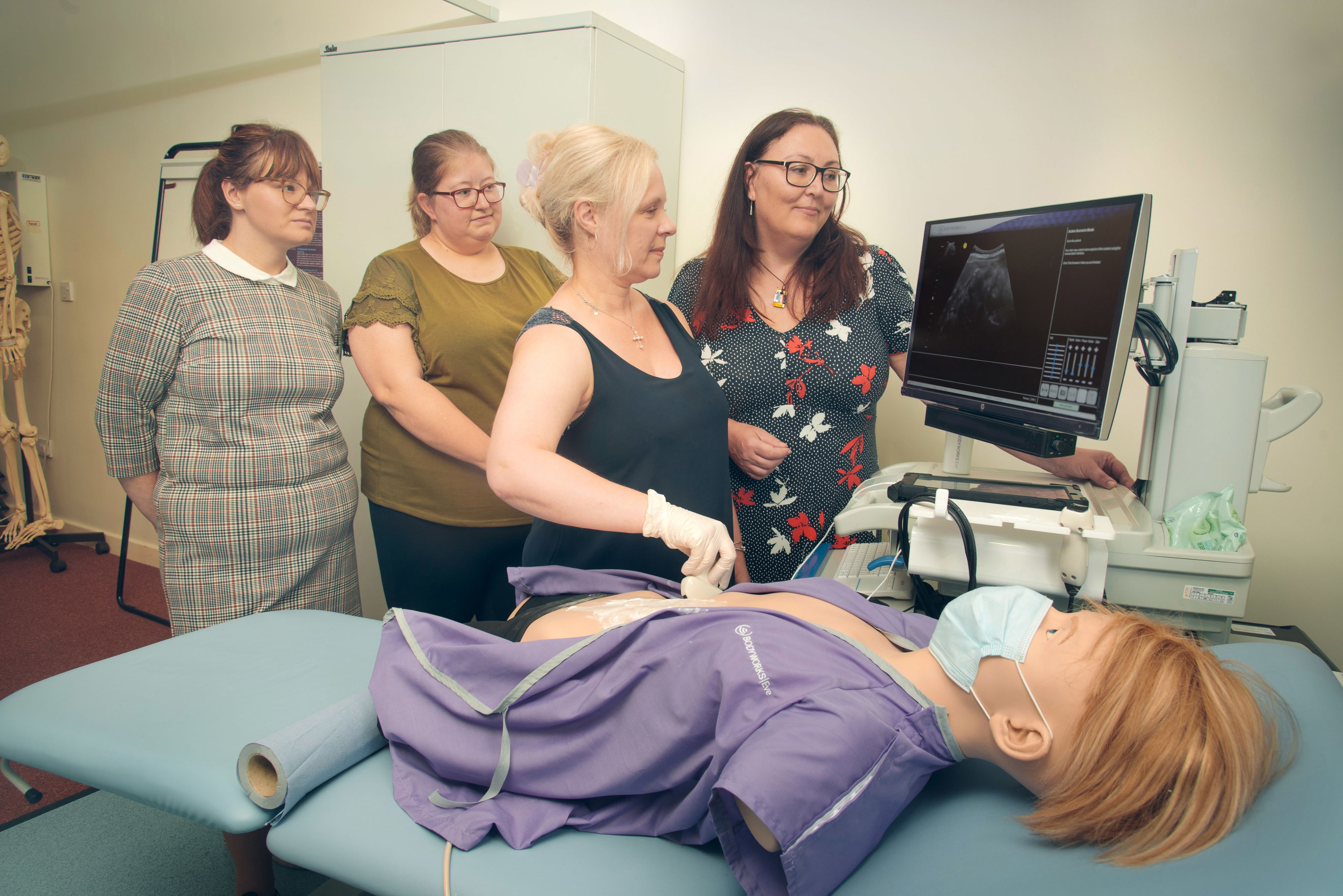
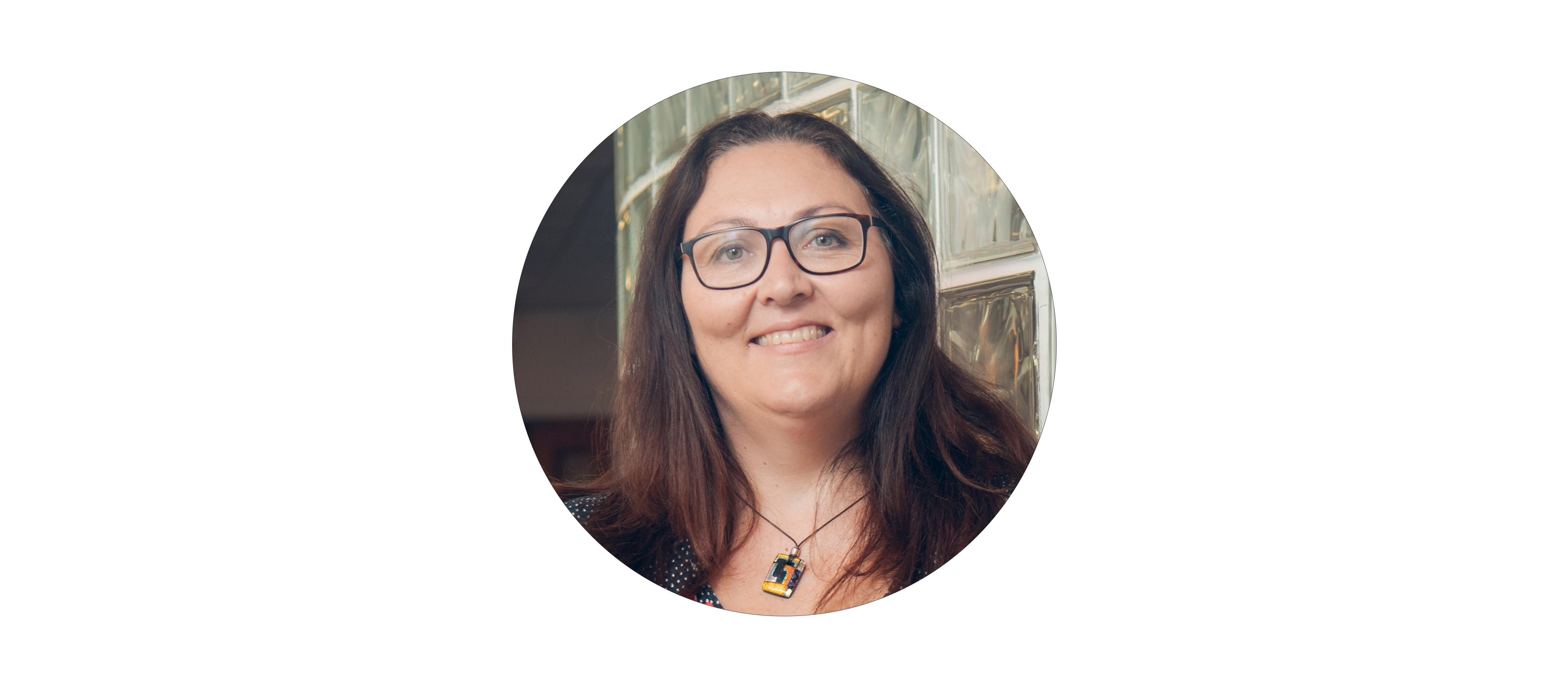
Michelle Hood
Michelle Hood
Following extensive stakeholder consultation, Sheffield Hallam University has launched a new and exciting opportunity for sonographer education: the degree apprenticeship.
We welcomed the first national cohort of sonographer apprentices in March 2023, and see the apprenticeship as part of the solution for increasing sonographer numbers while maintaining quality and the best care for patients.
Apprenticeship learning is essentially learning through work - in this case being employed by a local NHS trust while studying for at least 20% of your working hours. Your learning on the job is supported with seven to nine university block attendances throughout the year, in a blended approach with online and face-to-face academic teaching.
This approach allows delivery of theory that can be utilised and built upon in a practical approach within the workplace, supporting a ‘curriculum’ that grows from the experience of the learner, their work context, and their community of practice.
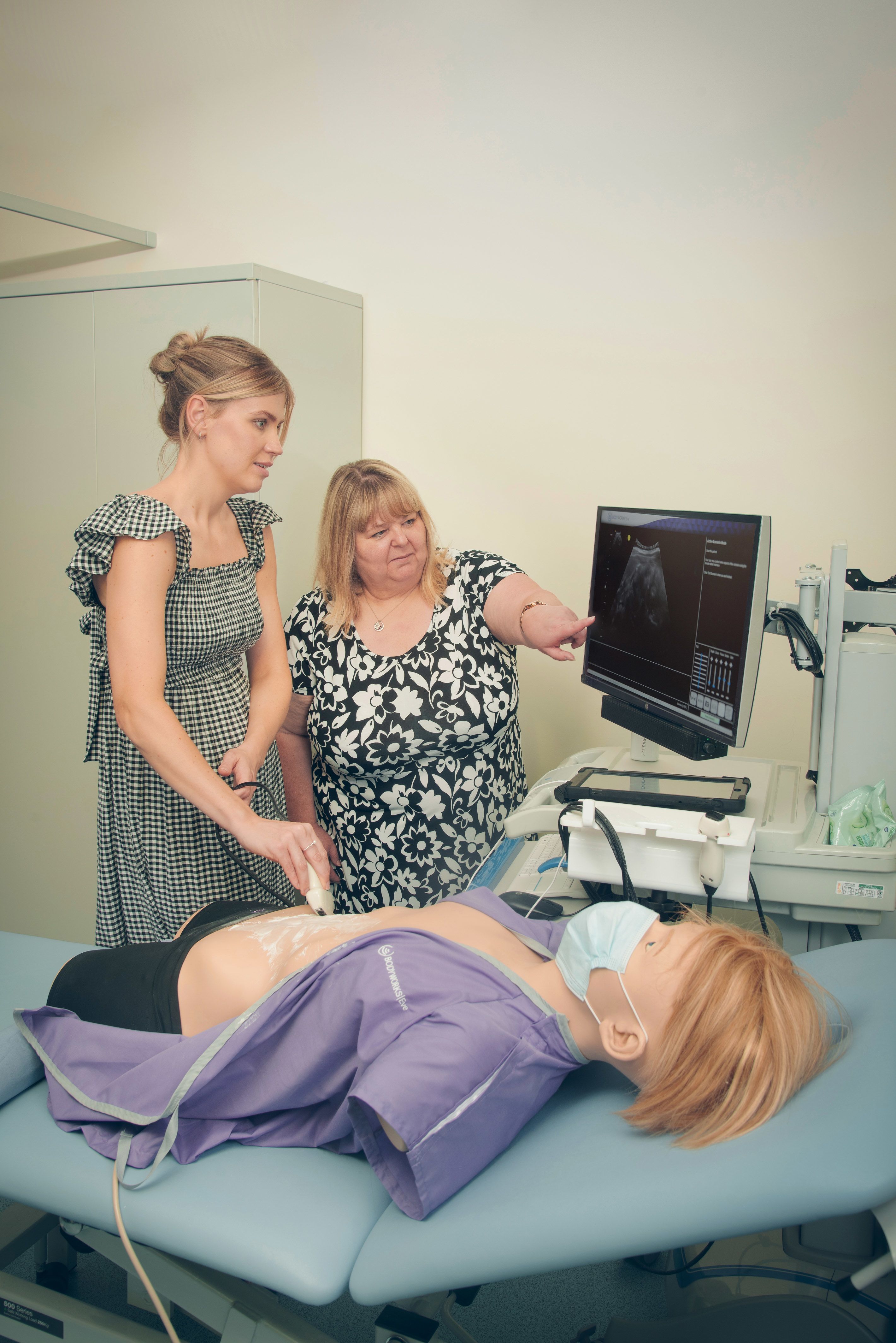
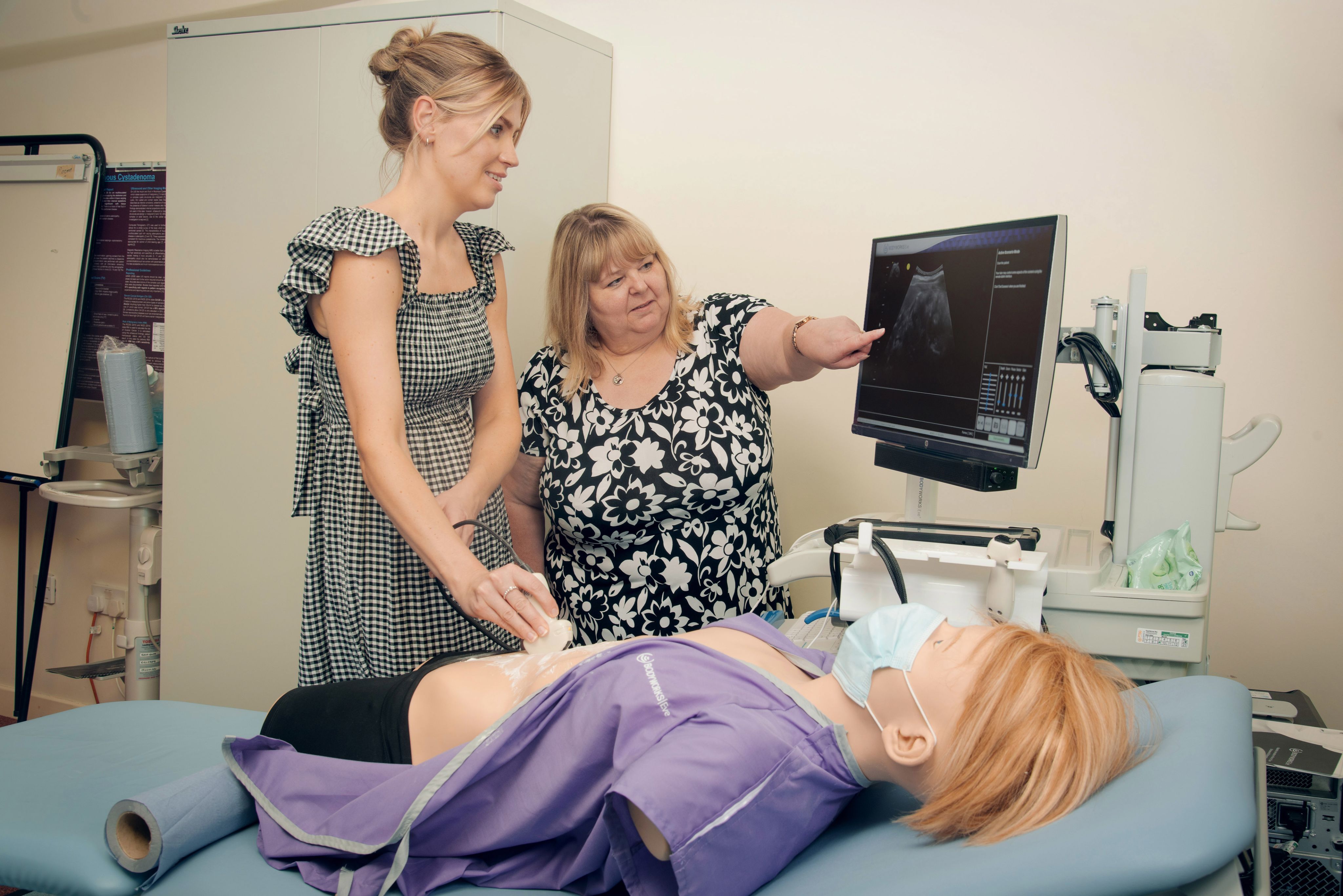
It has been a long process with many twists and turns but we have been passionately driven to secure the future of ultrasound as a profession. At SHU we truly believe that this lies in the education of the future workforce and development of the present workforce to align with the Ultrasound Career Framework.
As sonographers who have worked in the NHS, across services and systems and as part of national groups, we bring a wealth of experience in addressing the challenges associated with sonographer workforce deficits, increasing demand for ultrasound services and implementation of national policy.
As we face these challenges, one thing is clear - we simply need more sonographers. But the process of producing these sonographers is not as easy as it sounds. Feeder routes into sonography are often from professions that face shortages themselves (such as radiography and midwifery), and at present there is no statutory regulation for sonographers.
Complicated history
Additionally, ultrasound education and training has a complicated history aligning to how, where and when services have developed. It is both fragmented and complex, effectively resulting in sonography requiring a Masters level education.
Discussion around ultrasound provision has been underpinned by several national drivers and while some of the reports only identified and reported on the issues, what was clear is that, unless a new approach to sonography education was adopted, the present approach would not fulfil the increasing demand or workforce shortfall.
With the development of the sonographer apprenticeship occupational standard and the release of the proposed Ultrasound Career Framework in 2019 we saw an opportunity to increase the number of sonographers in the workforce through widening participation recruiting from a larger, more diverse pool of candidates. In addition, we found the release of the Preceptorship & Capability Framework by the British Medical Ultrasound Society (2022) aligns well with the degree apprenticeship sonographer route.
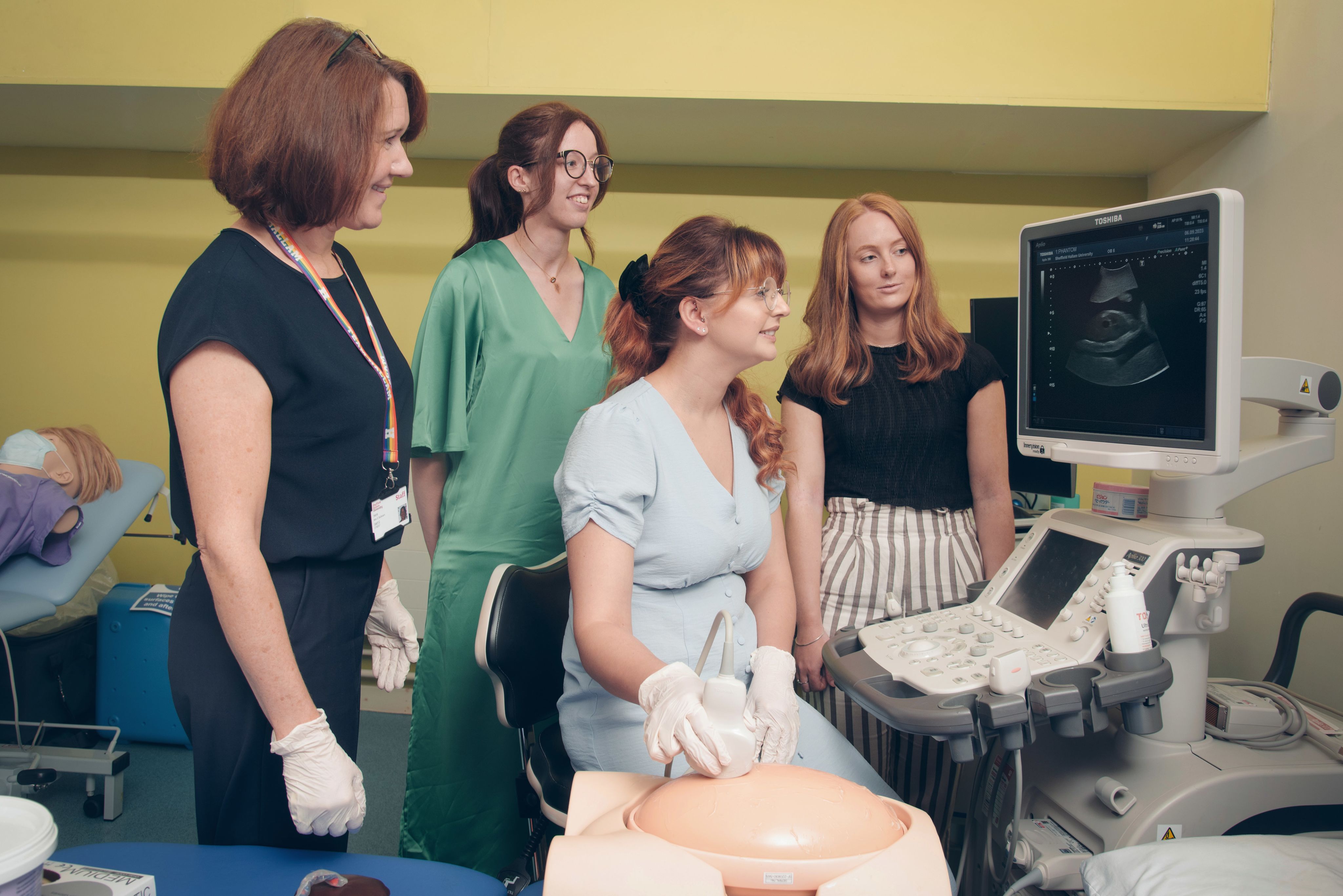

SHU actively engaged and supported key stakeholders in the process of developing the sonographer degree apprenticeship occupational standard and end-point assessment, listening to the needs and requirements of departmental managers, students, professional and government bodies, to ensure the final product would be one that fits service needs.
We performed apprenticeship-focussed research, speaking to other healthcare apprentices to inform and develop the pedagogical and pastoral requirements of these new learners and, as a result, the three-year BSc (Hons) Medical Ultrasound Degree Apprenticeship (DA) was approved, with our first intake coming on board earlier this year.
This is the first BSc programme approved nationally by the Consortium for the Accreditation of Sonographic Education. The course increases in complexity and builds and advances the apprentice’s knowledge, skills and behaviours, as they progress through their studies.
The well-established, embedded SHU integrated care curriculum modules include relevant British Values as apprentices begin to develop skills around the four pillars of practice. Throughout the programme, apprentices will be learning for work (learning how to do new or existing things better), learning at work (learning what takes place in the workplace) and learning from work (‘curriculum’ that grows out of the experience of the learner, their work context and their community of practice).

Figure 1 - Apprentice support at SHU
Figure 1 - Apprentice support at SHU
Our support network for apprentices is robust and comprehensive, including a myriad of services and people. Support for work-based mentors is also in place (Figure 1), as well as regular review meetings to ensure apprentices are achieving key milestones in the course, which are designed to be flexible to consider different levels of prior experience among the apprentices.
This first cohort of seven sonographer degree apprentices nationally brings a wealth of different experiences and knowledge, as well as enthusiasm in abundance. The ultrasound team at SHU are honoured to be part of this landmark shift in the education and training of sonographers and we are excited for the future of the ultrasound profession.
Meet the apprentices
Beth Taylor
I started in the department as a clinical support worker and worked with the sonographers directly on a daily basis so I already had an insight into the role and knew it was something I'd be interested in.
I completed a Level 2 apprenticeship at another Trust after finishing my first degree in events management and found this mode of learning much more engaging and enjoyable.
The strong support network you get from working more than studying is unbeatable. You learn more, you feel more comfortable in the workplace and you create greater workplace bonds doing an apprenticeship as opposed to the 'traditional' route.
The department you train in for three years is the department you will likely work in afterwards so all the friendships and relationships you create are long term, not just temporary.
My advice to others is that no question is a silly question! The trust and university know you are coming from a background of very limited knowledge and they will always help. Also, persistence is key! You are going to make mistakes, everybody does!
Lauren Young
I wanted to pursue a career in sonography because as an individual I have undergone the process of an ultrasound examination, and it sparked my interest in how the body was diagnosed using this modality. I had achieved a post as an assistant practitioner in vascular ultrasound, performing abdominal aortic surveillance scans and was ready for the next step.
The apprenticeship route was best for me because I’m a hands-on learner. I find that by learning the theory and being able to apply it in my job, I can better understand how the ultrasound machines work and how each organ lies within the body.
I would recommend the ultrasound apprenticeship because of the way which the lectures are delivered. For example, we can have a lecture about the renal tract, its function and how to optimise a scan to the best diagnostic value, and we then use ultrasound phantoms to put the theory into practice.
I would advise new apprentices to ensure they stay on top of their assignments as the workload can be high at times. I would also encourage them to be proactive, ensuring that they are not afraid to speak up to management or other sonographers if things are not working out, such as times on placement or the types of placement. Although the apprenticeship is tough going in terms of working and studying at the same time, persevere because it will all be worth it in the end!
Meghan Webb
Before the apprenticeship I was an assistant practitioner in vascular ultrasound. This gave me a taste of sonography which enhanced my passion to want to do the training. The apprenticeship route meant I could keep my foot in the door with my previous role as an AP and learn to train as a sonographer.
The apprenticeship programme gives the flexibility to learn through policies and procedures from the academic aspect and put it into practice in the ultrasound department. You can be the best quality professional this way as you can see what techniques work well, and what ways don't work so well, and you are still supported.
The advice I would give to other apprentices is to be prepared and organised. Due to the modules being taught intermittently I would prepare a folder for each module with the key notes kept in each. Take your time and focus your energy on each section until you ace it. Most importantly, have fun! You won't be in many situations where you can study and work and have the support of colleagues backing you up in a career you enjoy.
I am so grateful for the opportunity I have been given to be a part of this medical ultrasound apprenticeship programme. It has been a passion of mine for years and to be finally given the chance to fulfil it - I can’t thank the university and my department enough.
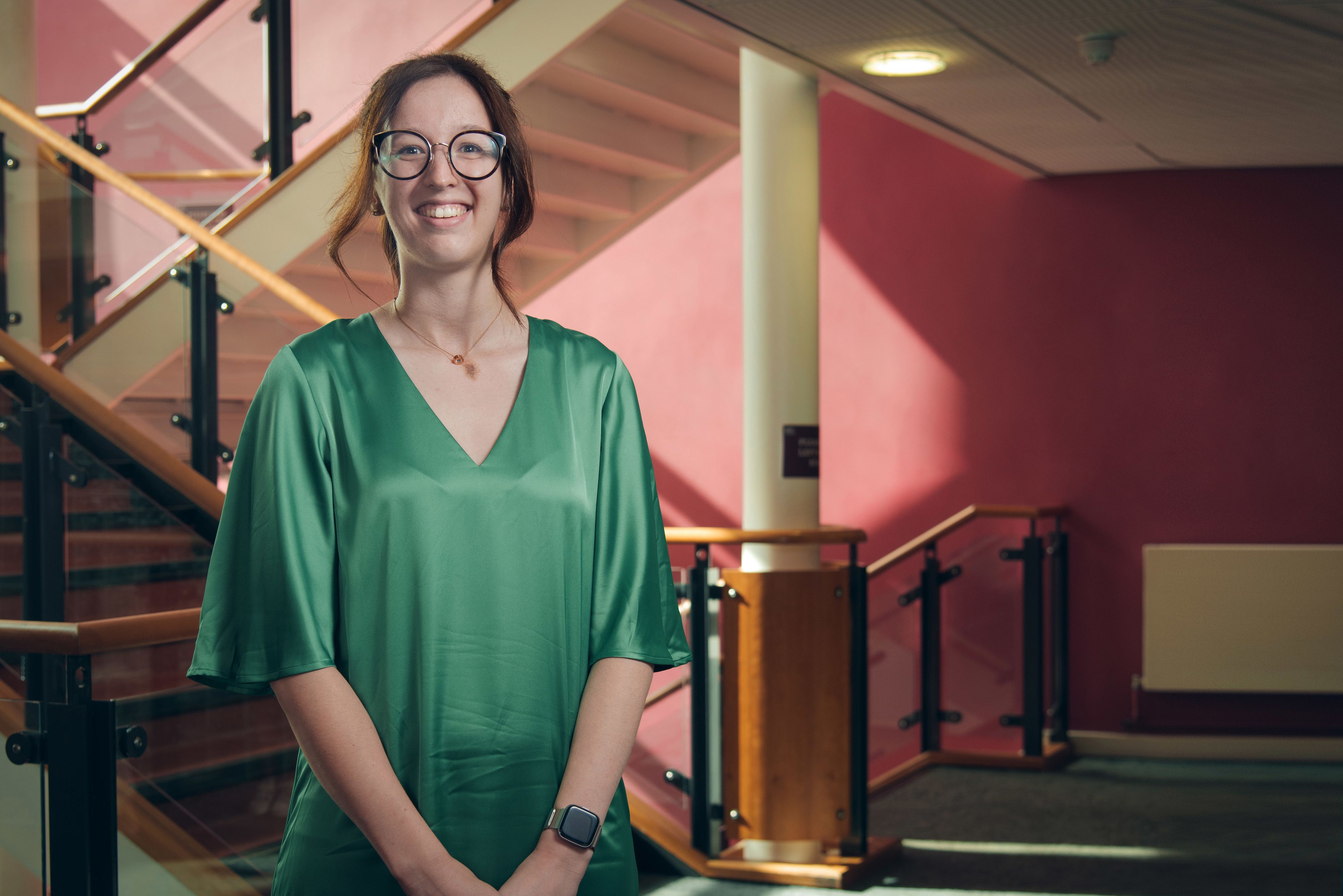
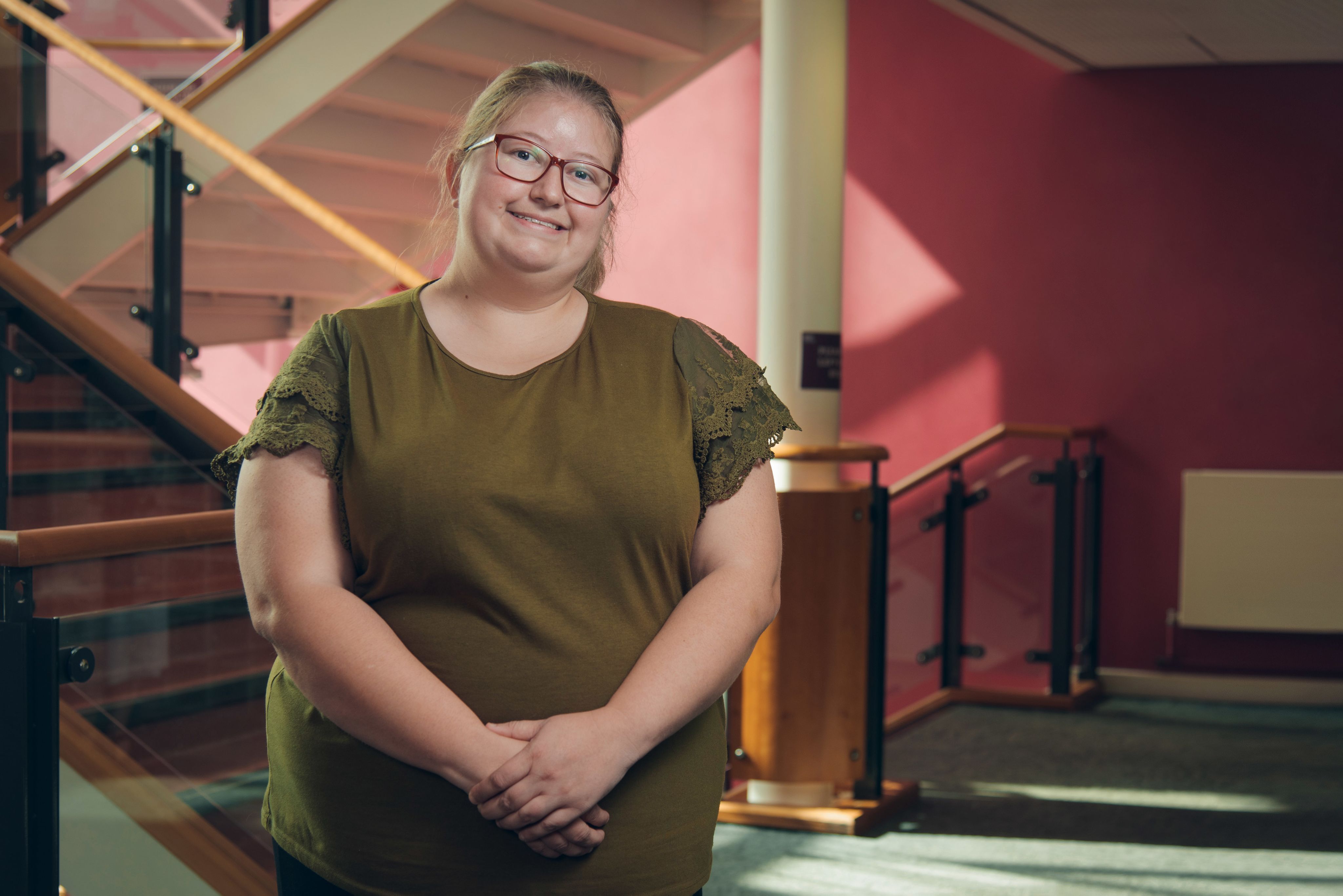
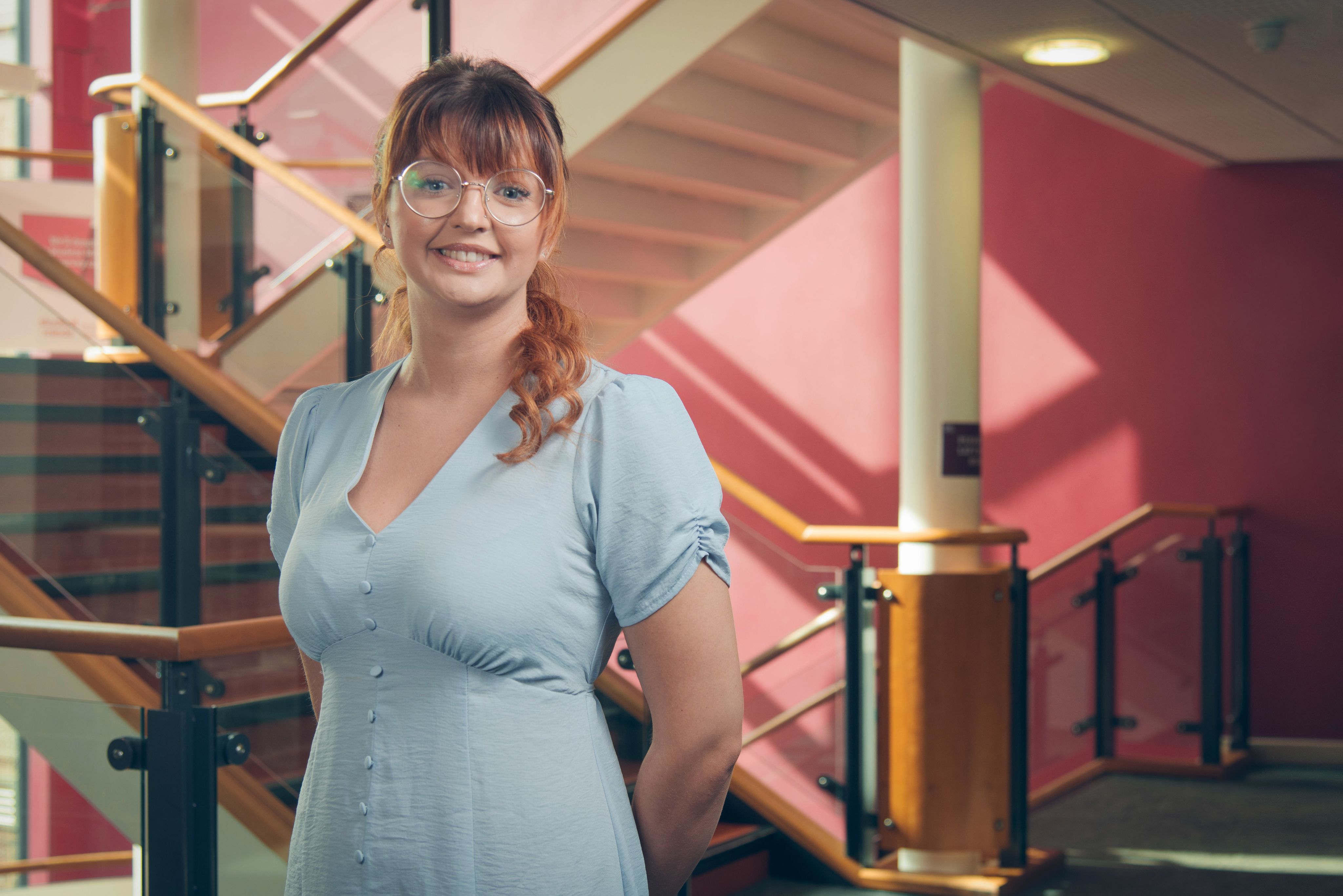
Chloe Tracey
wanted to become a sonographer for many years. As an assistant practitioner in a fetal medicine department, I have always been interested in how images were acquired from probe to the machine. I was also interested in the different anomalies found on scan and how they were diagnosed through ultrasound.
Working in a busy fetal medicine team also showed me the importance of good communication when an anomaly was found. As an apprentice, I want to ensure that good levels of communication are always maintained, and I hope that this continues in my training and as a qualified sonographer.
I chose the apprenticeship route as it enabled me to work and earn alongside gaining a degree. It also works for myself and my family. I would highly recommend an apprenticeship to others who want a degree while working and getting paid.
My advice for any other apprentices is to get as much time in different fields as possible because exposure to other departments can help in your training, even if it doesn’t seem relevant, for example the administration department in ultrasound. They have the knowledge regarding the day-to-day running of the department and that is priceless.
Molly Stanley
My interest in becoming a sonographer stems from my time working in radiology bookings and on reception where I got to learn about the modality in more detail. This experience alongside inspiration from those around me made me realise that I wanted to pursue a career in which I could help people and make a difference to their lives while using my biology A level and experience of the department.
I chose the apprenticeship route as it has given me more hands on experience working within the department that I hope to continue my career in. Learning on the job appealed to me because I feel I develop new skills and learn more effectively when I am constantly putting what I learn into practice and experiencing the day to day life in the role.
I would highly recommend this apprenticeship to anyone thinking about going into ultrasound as the support you receive from the university to help you thrive in the workplace is fantastic and really gives you the skills you need to succeed.
My advice to other apprentices would be to take every opportunity to have a go and expose yourself to as many new skills and experiences within the workplace as possible
Sarah Tugrul
After working in the ultrasound department as an imaging support assistant and seeing how it all worked, I felt it was where I wanted to be. I loved my role but being accepted on to this course is one of my proudest moments – now I’m able to train in something that I’m really passionate about, helping people and ensuring they receive a high standard of care.
The course also suits my personal life: I have three children and the apprenticeship allows me to be a mum and a student, as well as holding down a full-time job down at the same time.
I would totally recommend this apprenticeship to others out there. Follow your dreams, anything is possible no matter what background you have, and this course proves that for me. Learning while you work is priceless - you get to learn and absorb information from all kinds of people and also having that time on campus is amazing.
My advice for other apprentices is to take a deep breath and go for it. I honestly didn’t think I would get as far as I have but to see how much I have learned and skills I have gained in such a short space of time is truly amazing. Our sonographers seem to have superpowers that can see different shades of black, white and grey on a screen and interpret them within the human anatomy. I started in March 2023, and my superpowers are growing daily, so it is possible, and I encourage anyone to do it, especially when you have a great team of co-workers and university lecturers behind you every step of the way.
Lucy Ashmore
I started work in the ultrasound department as a radiology assistant. I found it fascinating and took great interest in watching the scans and asking questions. We all received an email unexpectedly about the apprenticeship. I was so excited and applied and was over the moon when I was accepted. This route is a brilliant way into ultrasound. On the job training means I still earn a wage and I get to further my career in a job that I did not think would be accessible for me.
The university has been amazing - incredibly supportive. I love learning in Sheffield and online. I find the teaching is at just the right pace. Any issues and worries have often been preempted or sorted out quickly. The Trust is totally on board and has organised my training, facilitated study days, and has been very supportive.
I would advise other apprentices to keep on top of the work and be organised. Enjoy the course and don’t panic! I love being on this apprenticeship and feel incredibly lucky and grateful to be one of the first people to do a degree in sonography.
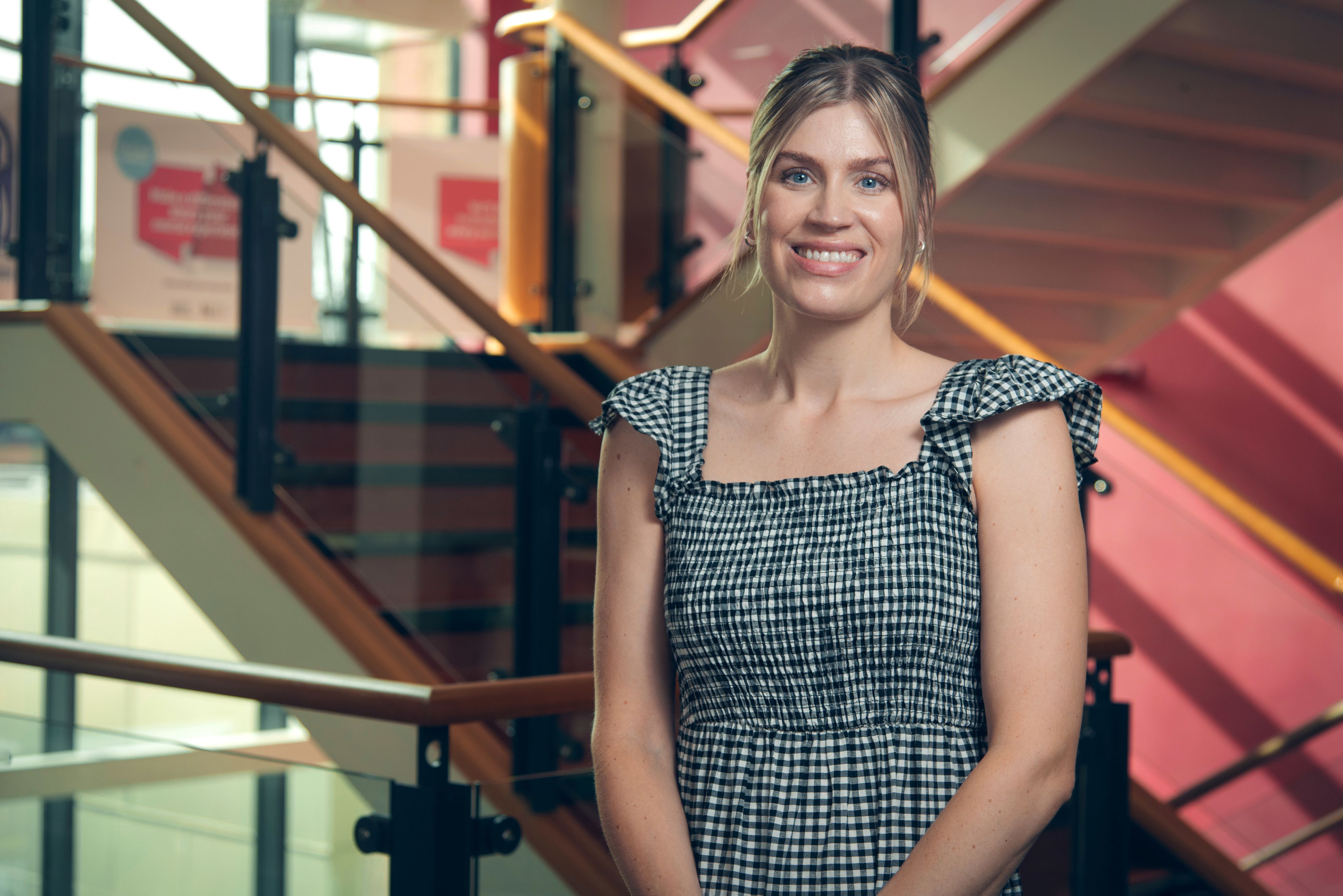
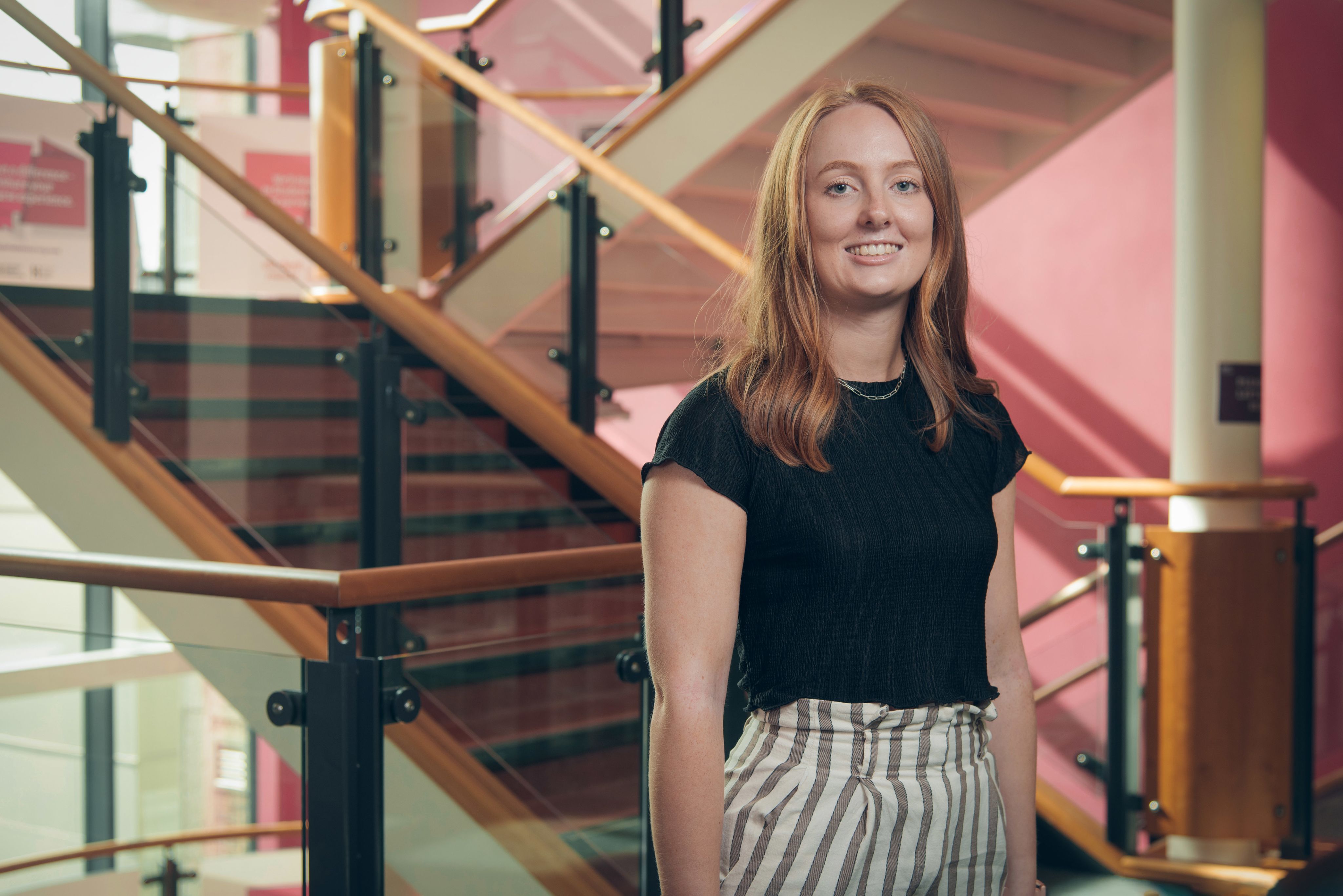
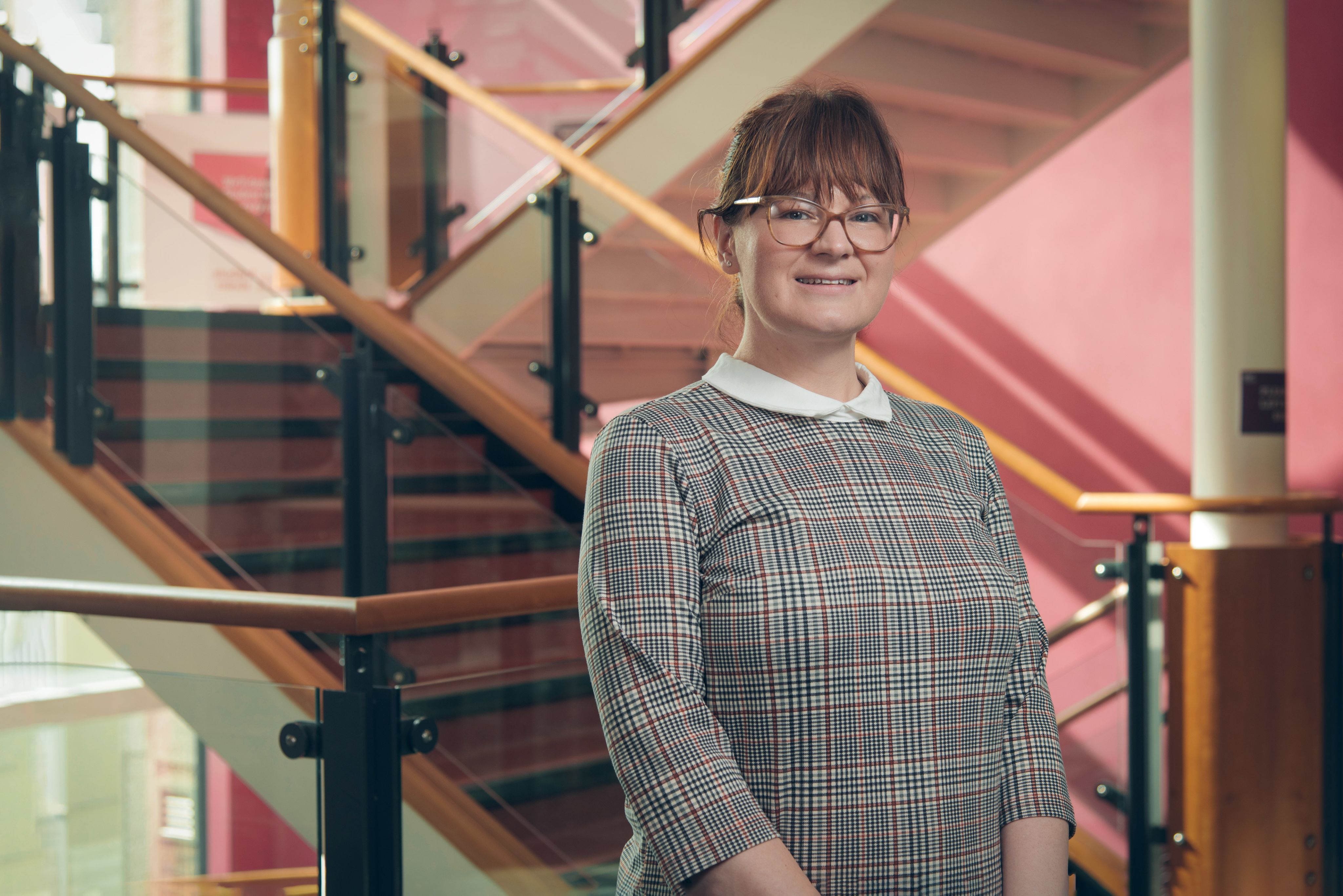
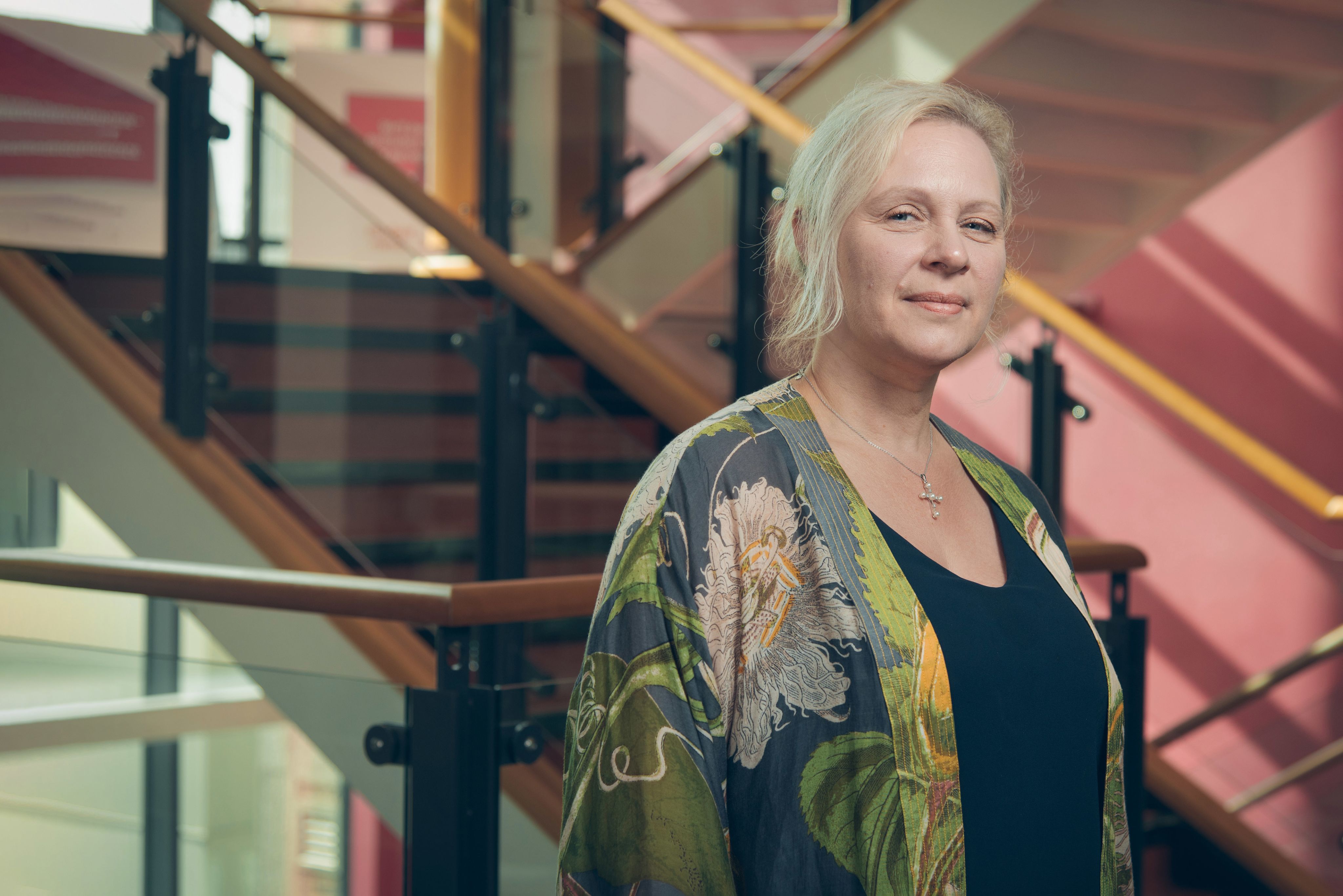
Beth Taylor
I started in the department as a clinical support worker and worked with the sonographers directly on a daily basis so I already had an insight into the role and knew it was something I'd be interested in.
I completed a Level 2 apprenticeship at another Trust after finishing my first degree in events management and found this mode of learning much more engaging and enjoyable.
The strong support network you get from working more than studying is unbeatable. You learn more, you feel more comfortable in the workplace and you create greater workplace bonds doing an apprenticeship as opposed to the 'traditional' route.
The department you train in for three years is the department you will likely work in afterwards so all the friendships and relationships you create are long term, not just temporary.
My advice to others is that no question is a silly question! The trust and university know you are coming from a background of very limited knowledge and they will always help. Also, persistence is key! You are going to make mistakes, everybody does!
Lauren Young
I wanted to pursue a career in sonography because as an individual I have undergone the process of an ultrasound examination, and it sparked my interest in how the body was diagnosed using this modality. I had achieved a post as an assistant practitioner in vascular ultrasound, performing abdominal aortic surveillance scans and was ready for the next step.
The apprenticeship route was best for me because I’m a hands-on learner. I find that by learning the theory and being able to apply it in my job, I can better understand how the ultrasound machines work and how each organ lies within the body.
I would recommend the ultrasound apprenticeship because of the way which the lectures are delivered. For example, we can have a lecture about the renal tract, its function and how to optimise a scan to the best diagnostic value, and we then use ultrasound phantoms to put the theory into practice.
I would advise new apprentices to ensure they stay on top of their assignments as the workload can be high at times. I would also encourage them to be proactive, ensuring that they are not afraid to speak up to management or other sonographers if things are not working out, such as times on placement or the types of placement. Although the apprenticeship is tough going in terms of working and studying at the same time, persevere because it will all be worth it in the end!
Meghan Webb
Before the apprenticeship I was an assistant practitioner in vascular ultrasound. This gave me a taste of sonography which enhanced my passion to want to do the training. The apprenticeship route meant I could keep my foot in the door with my previous role as an AP and learn to train as a sonographer.
The apprenticeship programme gives the flexibility to learn through policies and procedures from the academic aspect and put it into practice in the ultrasound department. You can be the best quality professional this way as you can see what techniques work well, and what ways don't work so well, and you are still supported.
The advice I would give to other apprentices is to be prepared and organised. Due to the modules being taught intermittently I would prepare a folder for each module with the key notes kept in each. Take your time and focus your energy on each section until you ace it. Most importantly, have fun! You won't be in many situations where you can study and work and have the support of colleagues backing you up in a career you enjoy.
I am so grateful for the opportunity I have been given to be a part of this medical ultrasound apprenticeship programme. It has been a passion of mine for years and to be finally given the chance to fulfil it - I can’t thank the university and my department enough.
Chloe Tracey
wanted to become a sonographer for many years. As an assistant practitioner in a fetal medicine department, I have always been interested in how images were acquired from probe to the machine. I was also interested in the different anomalies found on scan and how they were diagnosed through ultrasound.
Working in a busy fetal medicine team also showed me the importance of good communication when an anomaly was found. As an apprentice, I want to ensure that good levels of communication are always maintained, and I hope that this continues in my training and as a qualified sonographer.
I chose the apprenticeship route as it enabled me to work and earn alongside gaining a degree. It also works for myself and my family. I would highly recommend an apprenticeship to others who want a degree while working and getting paid.
My advice for any other apprentices is to get as much time in different fields as possible because exposure to other departments can help in your training, even if it doesn’t seem relevant, for example the administration department in ultrasound. They have the knowledge regarding the day-to-day running of the department and that is priceless.
Molly Stanley
My interest in becoming a sonographer stems from my time working in radiology bookings and on reception where I got to learn about the modality in more detail. This experience alongside inspiration from those around me made me realise that I wanted to pursue a career in which I could help people and make a difference to their lives while using my biology A level and experience of the department. I chose the apprenticeship route as it has given me more hands on experience working within the department that I hope to continue my career in. Learning on the job appealed to me because I feel I develop new skills and learn more effectively when I am constantly putting what I learn into practice and experiencing the day to day life in the role.
I would highly recommend this apprenticeship to anyone thinking about going into ultrasound as the support you receive from the university to help you thrive in the workplace is fantastic and really gives you the skills you need to succeed. My advice to other apprentices would be to take every opportunity to have a go and expose yourself to as many new skills and experiences within the workplace as possible
Sarah Tugrul
After working in the ultrasound department as an imaging support assistant and seeing how it all worked, I felt it was where I wanted to be. I loved my role but being accepted on to this course is one of my proudest moments – now I’m able to train in something that I’m really passionate about, helping people and ensuring they receive a high standard of care.
The course also suits my personal life: I have three children and the apprenticeship allows me to be a mum and a student, as well as holding down a full-time job down at the same time.
I would totally recommend this apprenticeship to others out there. Follow your dreams, anything is possible no matter what background you have, and this course proves that for me. Learning while you work is priceless - you get to learn and absorb information from all kinds of people and also having that time on campus is amazing.
My advice for other apprentices is to take a deep breath and go for it. I honestly didn’t think I would get as far as I have but to see how much I have learned and skills I have gained in such a short space of time is truly amazing. Our sonographers seem to have superpowers that can see different shades of black, white and grey on a screen and interpret them within the human anatomy. I started in March 2023, and my superpowers are growing daily, so it is possible, and I encourage anyone to do it, especially when you have a great team of co-workers and university lecturers behind you every step of the way.
Lucy Ashmore
I started work in the ultrasound department as a radiology assistant. I found it fascinating and took great interest in watching the scans and asking questions. We all received an email unexpectedly about the apprenticeship. I was so excited and applied and was over the moon when I was accepted. This route is a brilliant way into ultrasound. On the job training means I still earn a wage and I get to further my career in a job that I did not think would be accessible for me.
The university has been amazing - incredibly supportive. I love learning in Sheffield and online. I find the teaching is at just the right pace. Any issues and worries have often been preempted or sorted out quickly. The Trust is totally on board and has organised my training, facilitated study days, and has been very supportive.
I would advise other apprentices to keep on top of the work and be organised. Enjoy the course and don’t panic! I love being on this apprenticeship and feel incredibly lucky and grateful to be one of the first people to do a degree in sonography.
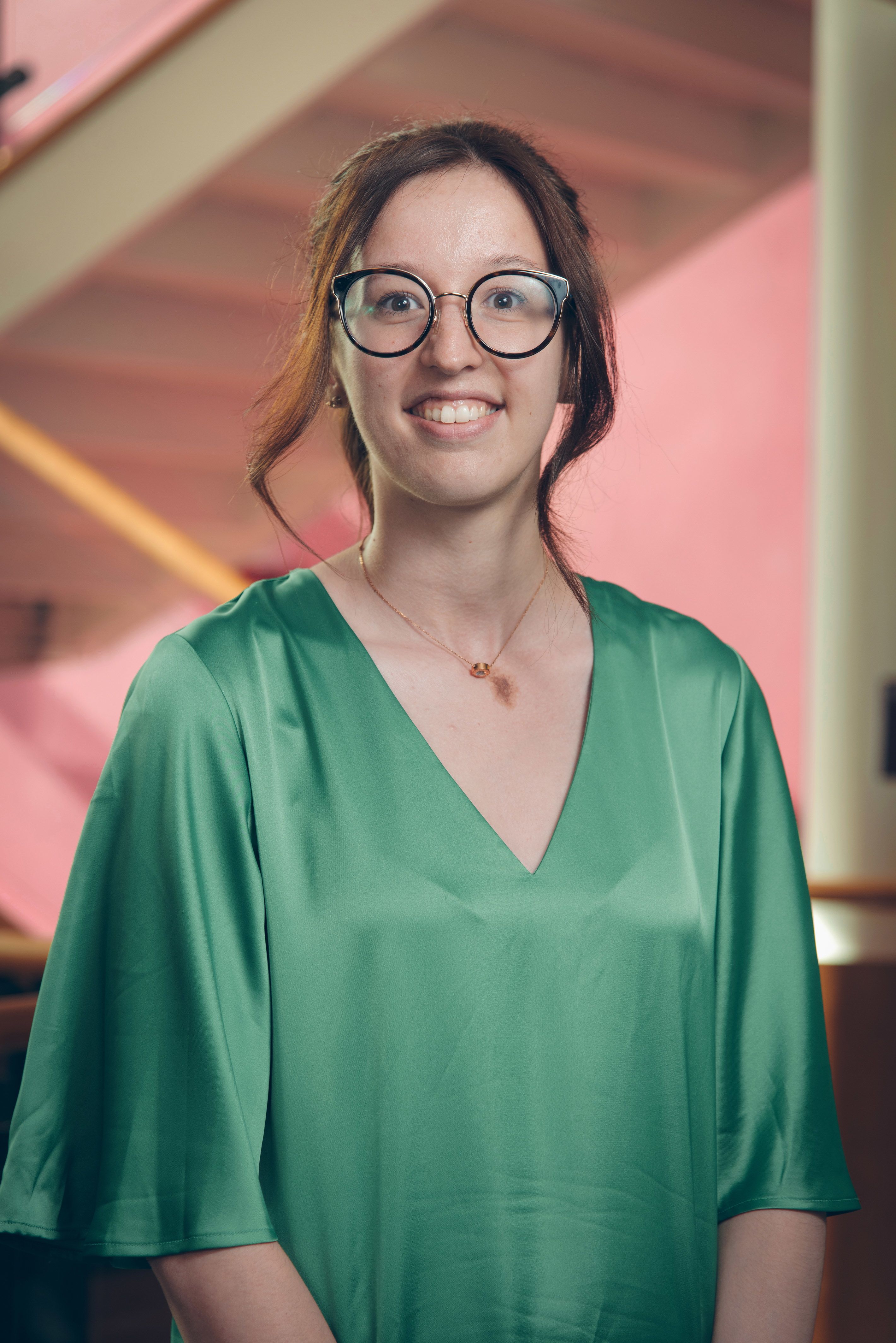
Beth Taylor
Beth Taylor
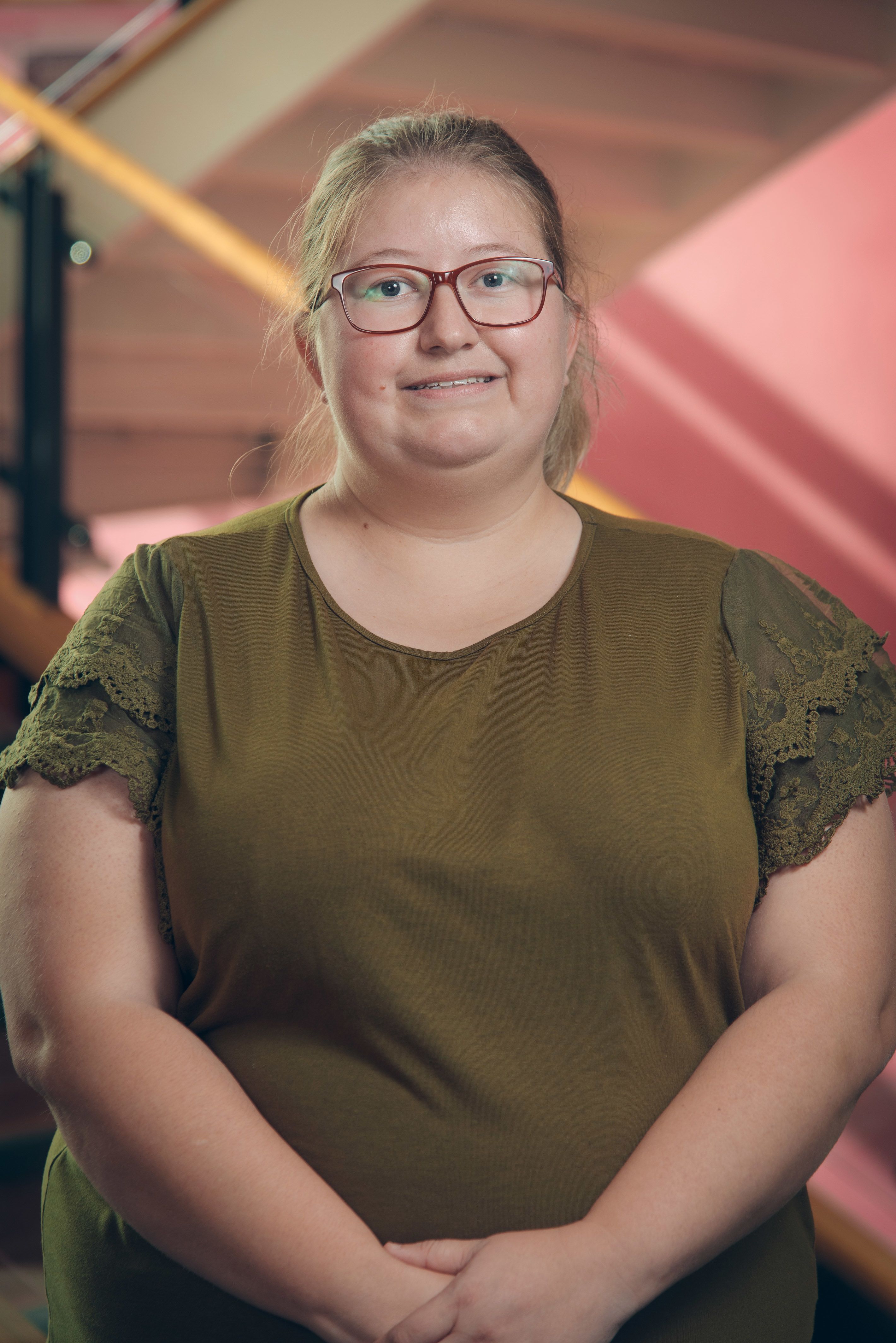
Lauren Young
Lauren Young
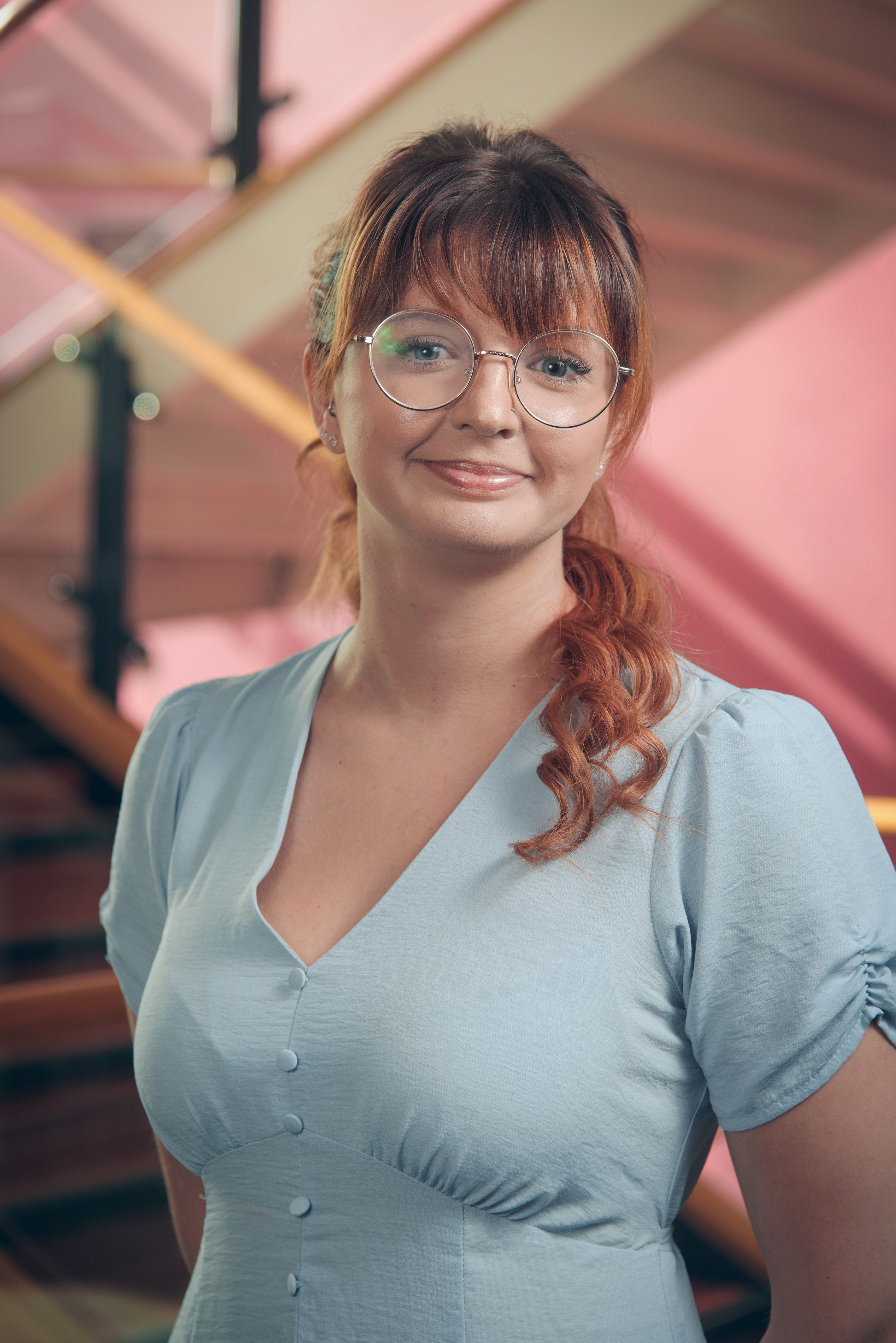
Meghan Webb
Meghan Webb
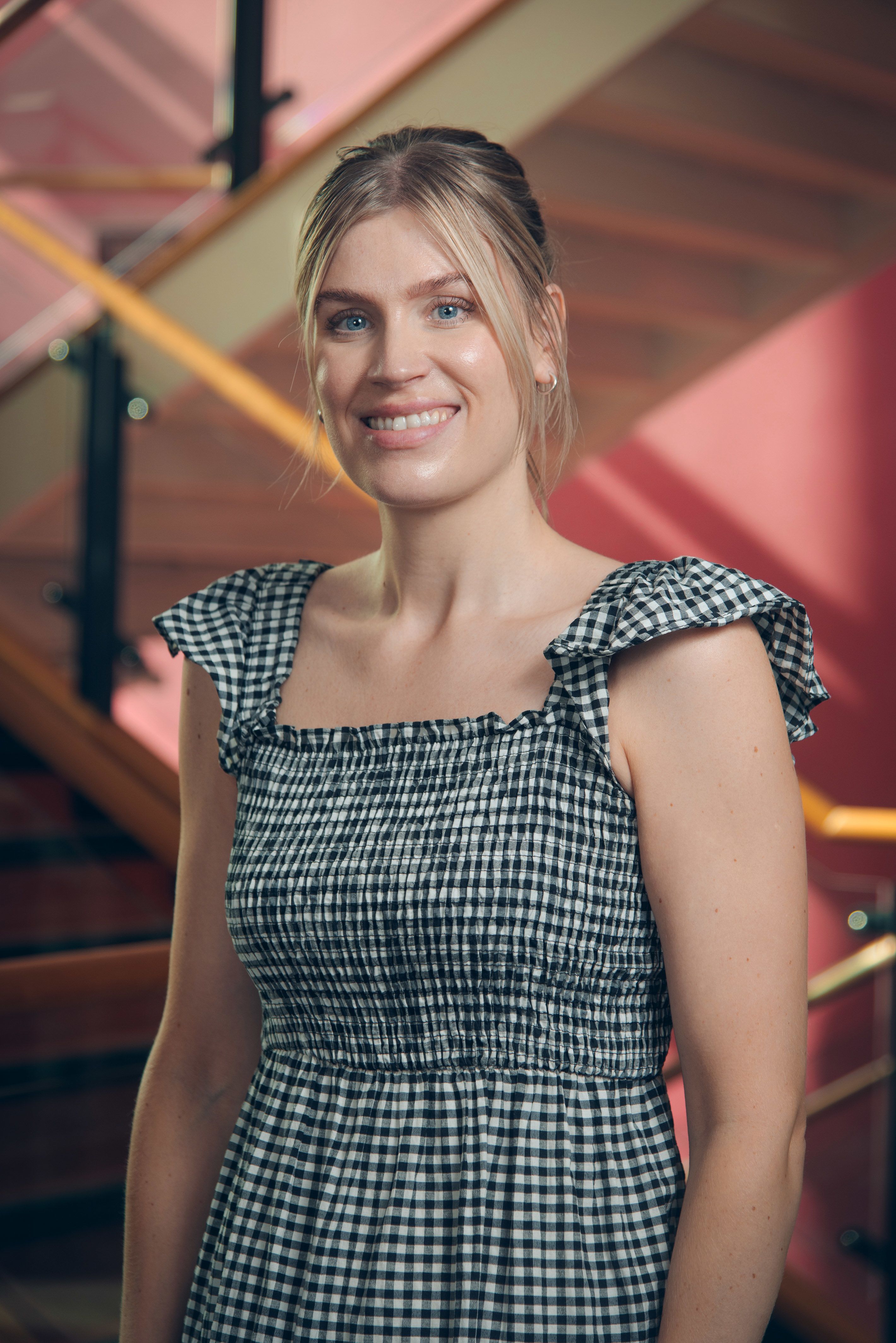
Chloe Tracey
Chloe Tracey
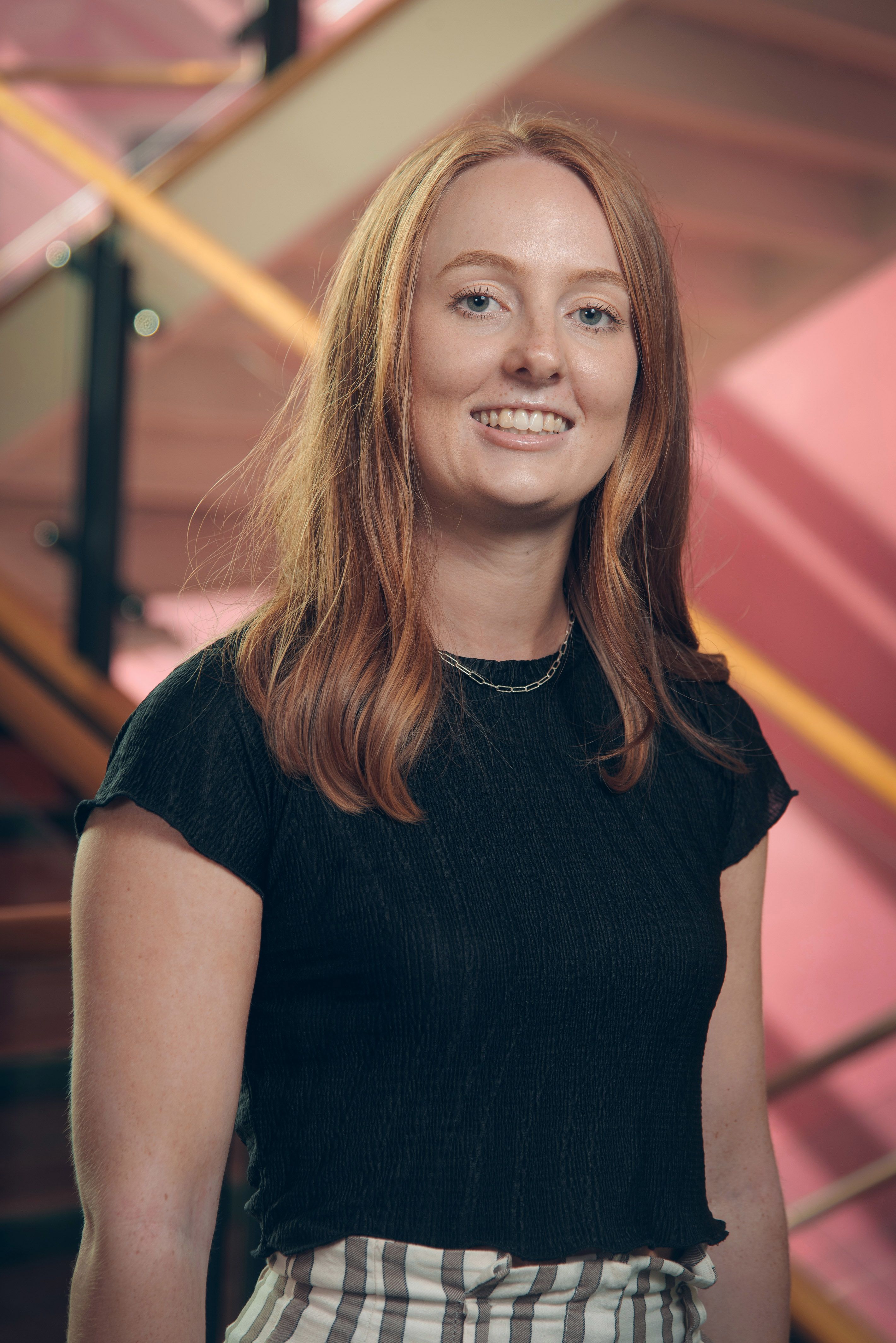
Molly Stanley
Molly Stanley
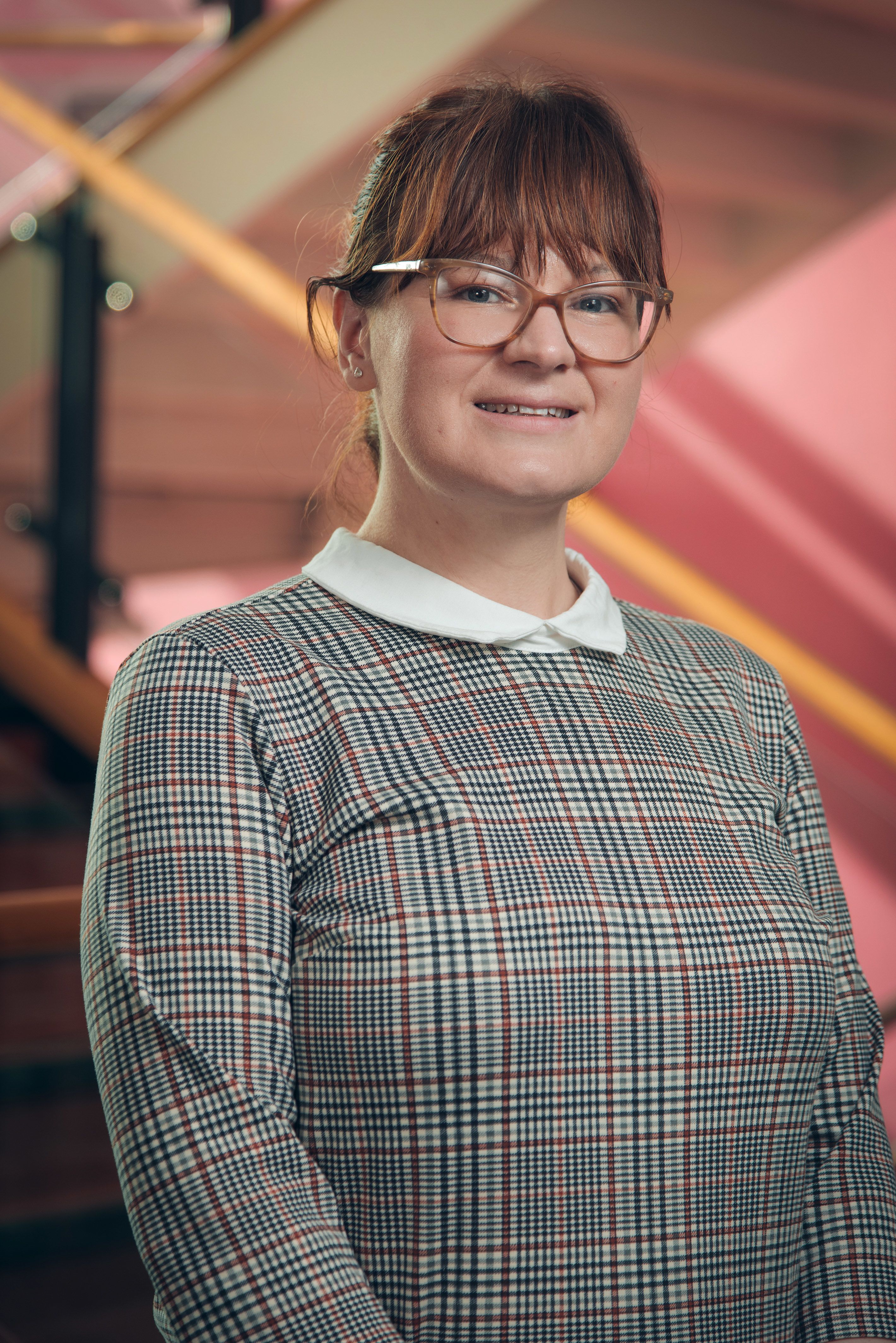
Sarah Tugrul
Sarah Tugrul
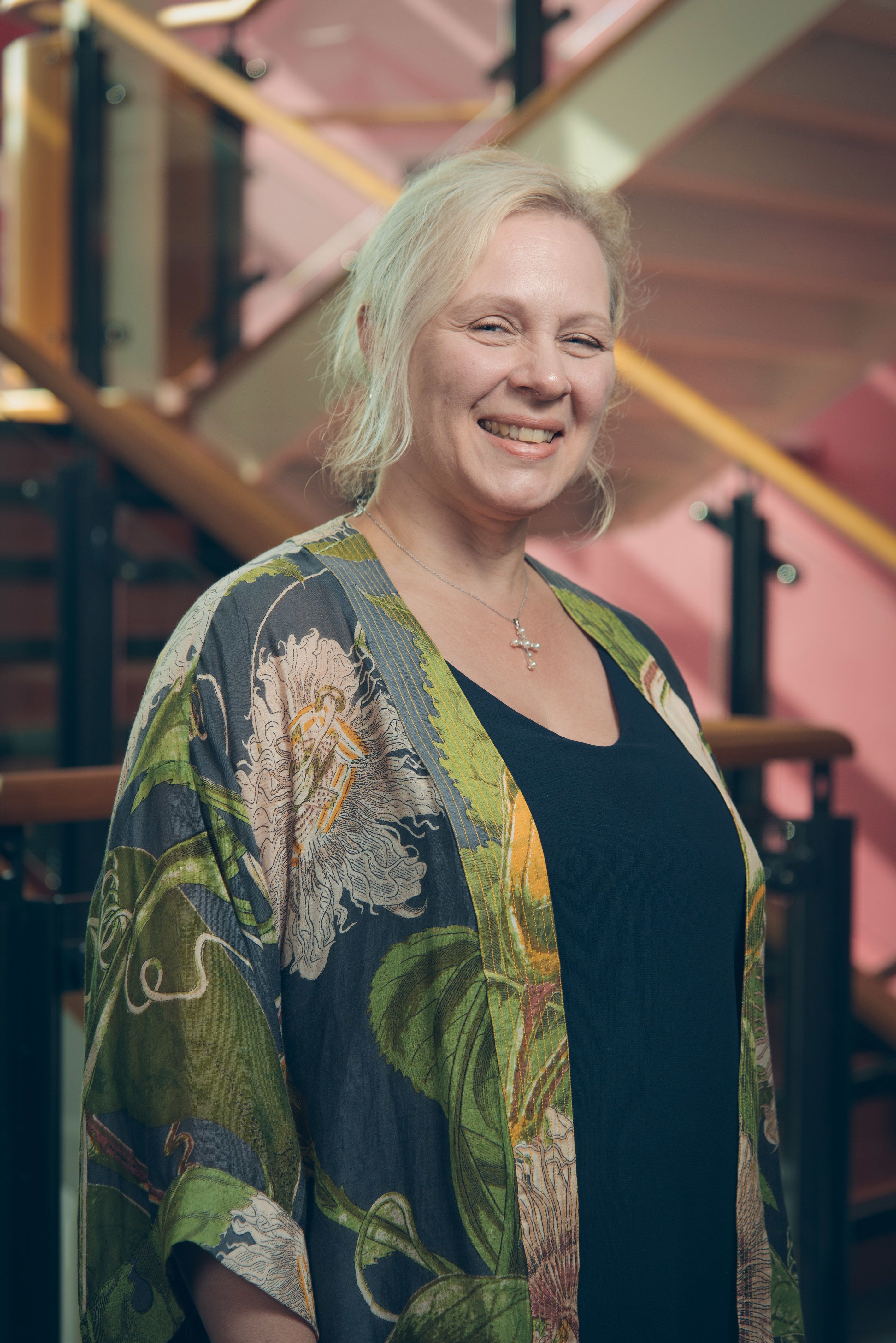
Lucy Ashmore
Lucy Ashmore
Introducing the tutors...
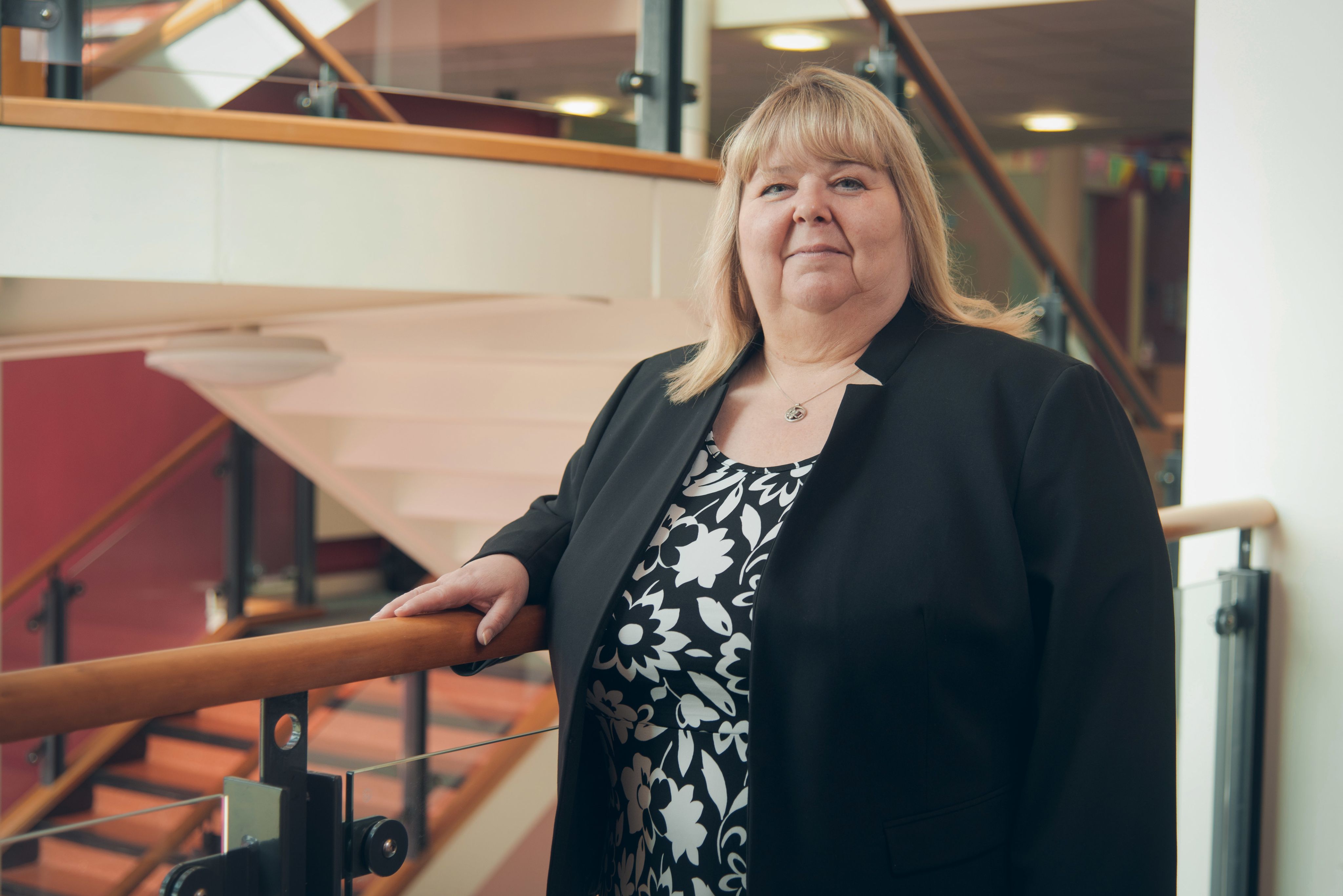
Dr Trudy Sevens
Principal Lecturer, Sheffield Hallam University and Lead Radiographer, South Yorkshire Integrated Care System
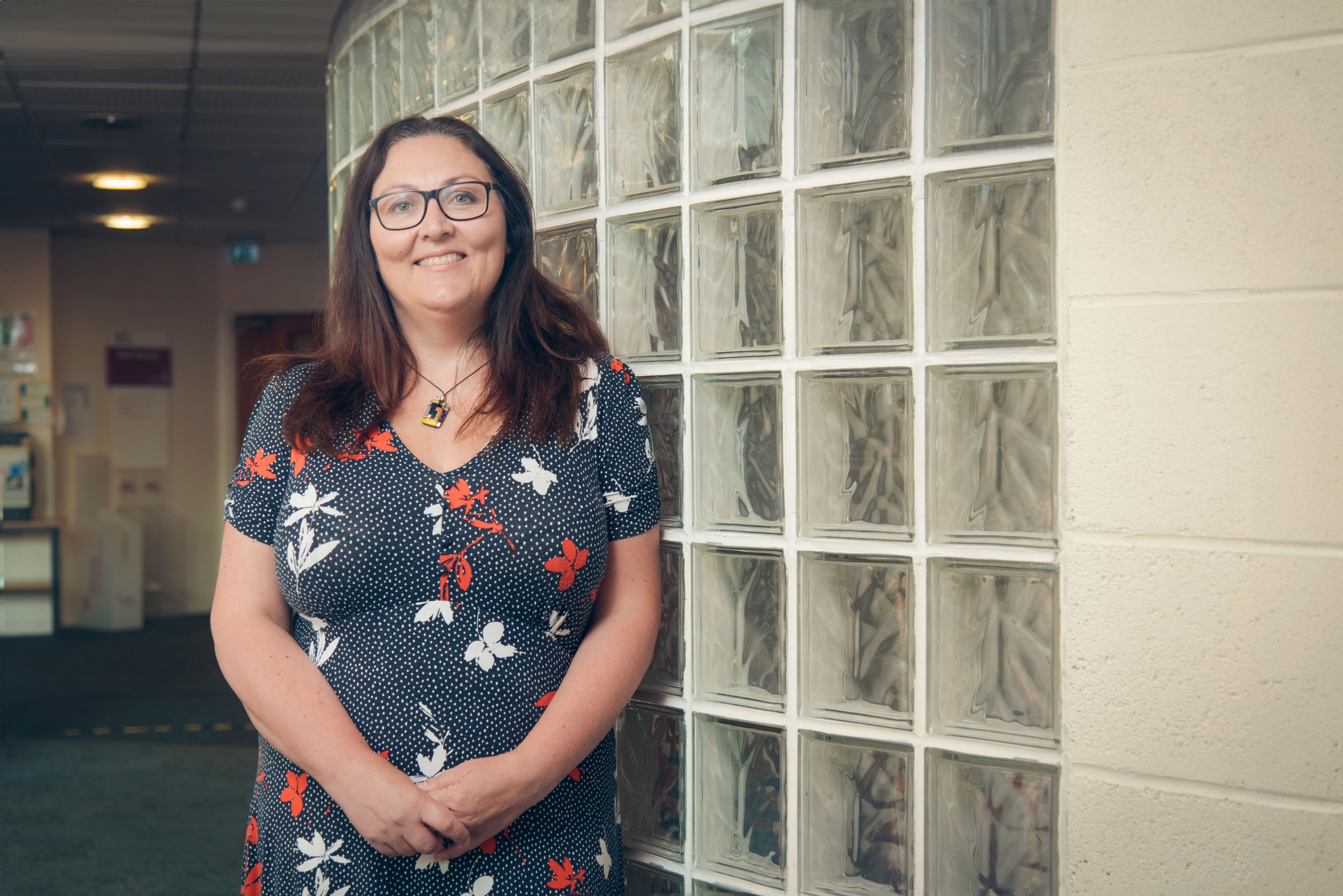
Michelle Hood
Senior Lecturer, Degree Apprenticeship Sonographer Course Lead
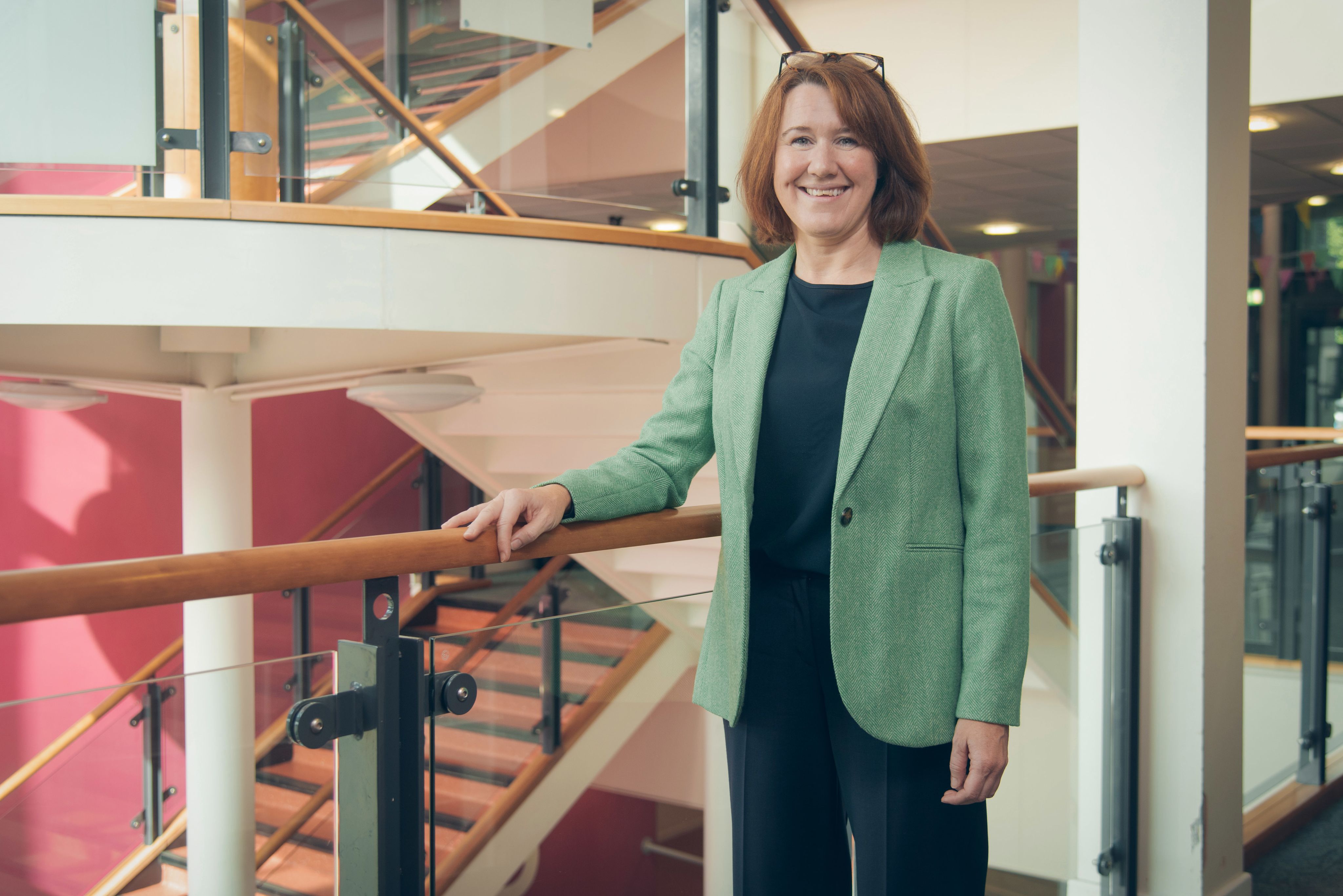
Liz Bullivant
Senior Lecturer, Postgraduate Ultrasound Course Leader
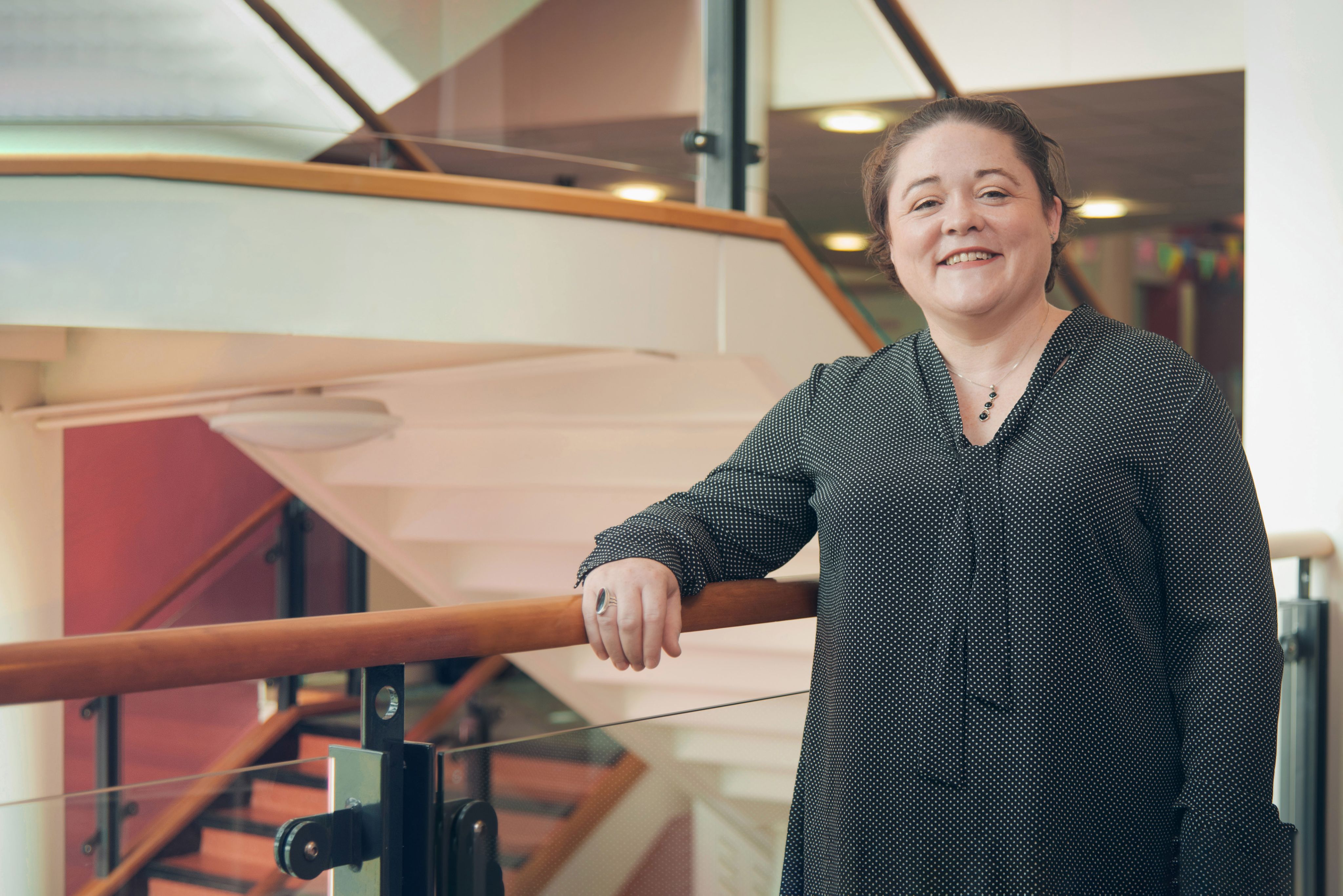
Catriona Hynes
Senior Lecturer and PhD student
Find out more...
Click here for full details of the medical ultrasound degree apprenticeship at Sheffield Hallam University. Find out more about the national apprenticeship schemes across the UK.
Read more in Synergy about the experiences of some of the first degree apprentices in diagnostic radiography.
Celebrate Medical Ultrasound Awareness Month (#MUAM) with the SoR Ultrasound Advisory Group! Follow our social channels throughout October @SCoRMembers to get involved.
Images credit: Chris Saunders
Now read...


